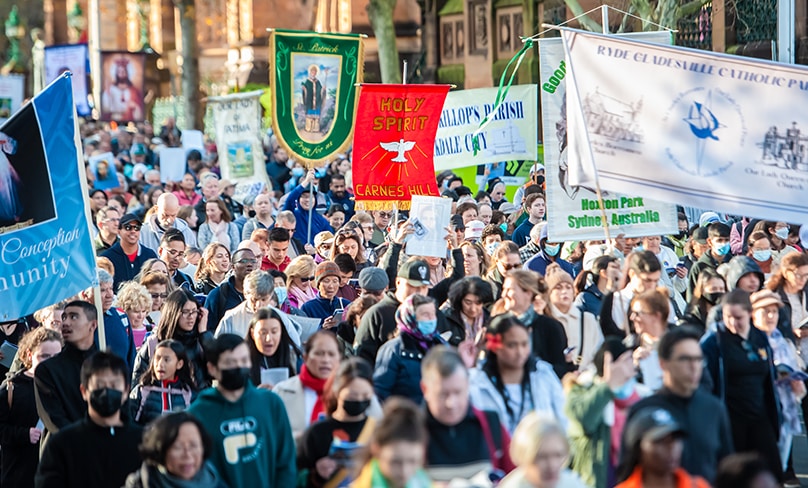
Faith and religious schools’ leaders say a report meant to guide the Federal government in drafting religious freedom legislation relating to religious schools will “severely limit” their ability to function and should be scrapped.
The long-awaited report by the Australian Law Reform Commission was met with outrage after it was tabled in parliament by Attorney-General Mark Dreyfus on 21 March.
The key recommendation is that the government repeal section 38 of the Sex Discrimination Act, which allows religious schools an exemption from discrimination laws on the basis of sexual orientation, gender identity, marital or relationship status, or pregnancy, in accordance with their beliefs.
In stripping section 38 it seeks to narrow the circumstances in which faith-based schools may preference the employment of staff and enrolment of students who hold the same beliefs.
It also recommends an amendment to the Fair Work Act to narrow the circumstances in which schools could give preference to staff of the same faith unless deemed “reasonably necessary to build or maintain a community of faith.”
This week Prime Minister Anthony Albanese said he would not make promised changes to the Sex Discrimination Act or introduce religious freedom legislation without prior bipartisan support.
Before the last Federal election he promised to introduce religious freedom legislation that would allow schools to preserve their religious ethos while protecting students from discrimination.
Dreyfus stressed that the report was only meant to provide advice to the government and said it will seek to enhance protections against discrimination on any grounds.
“Just as commonwealth law already prohibits discrimination on the basis of race, gender, sexuality, disability and age, no one should be discriminated against because of their faith,” he said.
“Equally, no students or member of staff should be discriminated against because of who they are.
“At the same time, religious schools must continue to be able to build and maintain communities of faith.”

Bishops and faith schools leaders disappointed
Archbishop of Melbourne Peter Comensoli, speaking on behalf of the Australian Catholic Bishops’ Conference, called on the government and opposition to reject the “unhelpful” report and work with faith communities to draft better laws.
“It falls far short of meeting the government’s election promises,” Bishop Comensoli said in a statement.
“Parents choose to send their children to Catholic schools to be educated in an environment that upholds and exemplifies a Catholic ethos.
“Catholic schools want to be free to be authentically Catholic in their daily activities.
‘Catholic schools exist to be witnesses of a Catholic mission and ethos by all staff supporting, teaching, and exemplifying a Catholic approach to life.
“Catholic schools want the capacity to employ and manage staff who support the schools’ Catholic mission and ethos.”
The National Catholic Education Commission said the recommendations would severely limit the ability of faith-based schools to operate and teach according to their ethos.
Executive Director Jacinta Collins said the “disappointing” recommendations were at odds with the inquiry’s own terms of reference, the government’s own commitments and the desire of families who choose faith-based schools.
“Religious freedom is a fundamental human right and the parliament has a responsibility to enact Australia’s international commitments to ensure parents can continue to choose a school in line with their values and beliefs and provide faith-based schools with the certainty to employ staff that support their ethos,” she said.
“In making their recommendations, the ALRC has critically neglected the Attorney General’s third term of reference to ensure that religious schools can ‘continue to build a community of faith by giving preference, in good faith, to persons of the same religion as the educational institution in the selection of staff’.
“The Albanese Government also committed to religious freedom in its 2023 party platform to ‘support the right of all Australians to have and to manifest their religion or beliefs, and the right of religious organisations to act in accordance with the doctrines, tenets, beliefs or teachings of their faith’.
“Any path forward must include a broad community and political consensus that protects religious freedom and respects the rights of Australian families to educate their children according to their faith.”
The Australian Association of Christian Schools slammed the report as a “shameful attack” on freedom of belief and religion in Australia.
In a joint statement with Christian Schools Australia and Associated Christian Schools it said the government should reject the recommendations “immediately” as the final versions offer even less protections for faith-based schools than the initial consultation report.
“Hundreds of thousands of Australian parents choose to send their children to faith-based schools because they value this type of education, said CSA Director of Public Policy Mark Spencer.
“They enrol their children knowing that our teachers and staff are aligned with our beliefs and that students will be taught according to our beliefs.
“If these recommendations are adopted, parents would lose this right, and the government has no right to remove this choice.”
Governments need to understand that in Christian school communities all teachers and staff engage with students from a faith perspective both inside and outside the classroom and are expected to be available for devotion, prayer and support, he said.
“A staff member who doesn’t share and support our beliefs cannot effectively teach our beliefs or support students according to our beliefs,” Mr Spencer said.
Earlier in the week, Hobart Archbishop Julian Porteous said proposals to remove the protections for religious schools should be rejected because they are “a most serious threat” to their existence and would permit teachers to promote views contrary to Catholic teaching and schools’ culture.
“Our Catholic schools must be able to remain Catholic,” he told The Australian.
